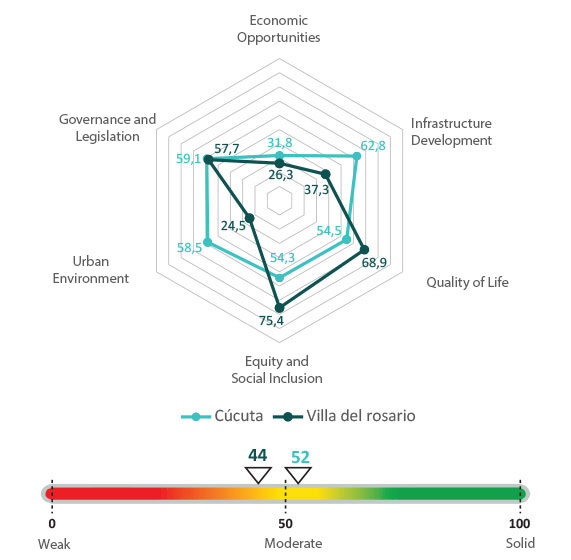
According to a reading of the levels of territorial prosperity in the cities of Cúcuta and Villa del Rosario, developed on the basis of the indicators of the Urban Prosperity Index (CPI), The main strengths of these municipalities are their health and education systems with solid values both in terms of accessibility to physical infrastructure (health and education facilities) and social indicators* that show the efficiency of the systems, followed by conditions of gender inclusion in terms of the participation of women in the economically active population. Favorable urban conditions are also highlighted in terms of road layout and connectivity capacity of the city, especially for the municipality of Cúcuta.
* These indicators include: life expectancy at birth, under-five mortality rate, vaccination coverage, maternal mortality, literacy rate, average years of schooling (disaggregated between males and females), attendance of children under 6 years of age in early childhood development programs, net higher education rate.

The results of these indicators show that, among the main challenges for prosperity, is the equitable distribution of social support infrastructure, especially in terms of public space, green areas and cultural facilities. Likewise, it is considered essential to improve housing conditions, consolidate a metropolitan scale mass transportation system and improve the population’s physical and digital connectivity conditions.
Results of infrastructure measurement for development:
Cúcuta 63.8 / 100
Villa del Rosario 43.5 / 100
The results of these indicators indicate that, among the main challenges for prosperity, Cúcuta and Villa del Rosario must improve security and protection conditions for their inhabitants. Cúcuta has 32.57 per 100 thousand inhabitants. According to the citizen security report for the first quarter of 2020, the general rate for the two municipalities for the third quarter of 2020 was 18.59 homicides per 100,000 inhabitants and the communes with the highest homicide rate are Comuna 1, 6 and 9 Cúcuta, and the municipal capital Villa del Rosario. Likewise, the increase of green areas and public spaces in the territory is identified as a challenge, together with very low values of green areas per capita reflect the weakness of prosperity in this aspect. Among the opportunities of this dimension, there are adequate health conditions with life expectancy at birth of 73.3 years, approaching the ideal value of 84 years. On the other hand, the education dimension presents very solid values considering that 95% of the population knows how to read and write and the average schooling time is 10.23 years.
Results of quality of life measurement:
Cúcuta 54.5 / 100
Villa del Rosario 68.9 / 100


The results of these indicators show that, in environmental matters, the main challenge highlighted by this analysis is the information gap and the lack of instruments for monitoring environmental conditions such as air quality, solid waste management and wastewater treatment.
Results of urban environmental measurement:
Cúcuta 47.6 / 100
Villa del Rosario 24.5 / 100
The results of these indicators show that one of the main challenges for territorial prosperity is access to adequate employment opportunities to reduce social gaps, monetary poverty indexes and unsatisfied basic needs, and promote access to adequate quality of life conditions.
Results measurement of economic opportunities:
Cúcuta 32.5 / 100
Villa del Rosario 29.9 / 100


The results of these indicators show social gaps present in the territory in terms of monetary poverty, precarious housing and social inequality. In terms of gender inclusion, more information is needed to determine equal access to rights, since only the analysis of employment disaggregated by gender, which shows equal conditions for men and women, has been considered. Finally, in terms of urban diversity, the territory requires promoting land use mixticity that allows consolidating more compact environments, with less dependence on the center of the Metropolitan Area of Cúcuta and that facilitate access to opportunities and services.
Results of social equity measurement:
Cúcuta 74.3 / 100
Villa del Rosario 62.2 / 100
The results of these indicators indicate that the main challenges facing the territory in terms of governance and legislation are the promotion of citizen participation, the strengthening of the system for collecting revenues due to the high rates of informality, and the improvement of processes for the registration of companies. There are also average levels of citizen participation (50%), which indicates the population’s interest in participating in decision making and, therefore, in participating in citizen participation processes. There is no information on citizen participation and low values for accountability.
Results of inclusive governance measurement:
Cúcuta 63 / 100
Villa del Rosario 65.6 / 100
